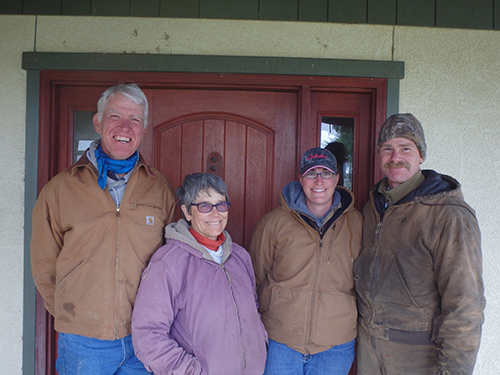 The farm sits atop 2,300 acres of carefully managed pasture and cropland. When the Petersons purchased the property in 1998, they were cautioned about its vulnerabilities to drought and blizzards. The family immediately set out to take important steps to make the pastures drought-resilient, developing water sources, cross fencing implement a deferred rest rotation grazing system, and planting and fencing windbreaks.
The farm sits atop 2,300 acres of carefully managed pasture and cropland. When the Petersons purchased the property in 1998, they were cautioned about its vulnerabilities to drought and blizzards. The family immediately set out to take important steps to make the pastures drought-resilient, developing water sources, cross fencing implement a deferred rest rotation grazing system, and planting and fencing windbreaks.
Under Patrick’s leadership, the farm was transformed to no-till to prevent erosion and improve water retention, despite knowing the crop yields would initially take a hit. After eleven years, their investment in no-till management is paying off.
Cover crops are an important aspect of the Petersons’ commitment to biodiversity. The family uses a multispecies “cocktail” of annual forages for intensive grazing. The mix contributes to the health of the soil, while also providing a nutritional food source for the cattle and pollinator habitat.
The Petersons are committed to improving productivity on their acreage by enhancing the quality and diversity of their ecosystems on pastures and cropland. Their crop rotation includes corn, pinto beans, field peas and wheat. To avoid having to feed their cattle harvested forage, they moved the calving date to May to calve on cereal rye, allowing their cattle cycle to align with the nutrition provided in the forage cycle. Rather than bailing their sorghum, the cattle graze it in the swathes during winter.
One of the biggest testaments to the resilience of their land occurred during the 2012 drought, the worst in the last 25 years. After a pasture holding a third of their herd was depleted early, the Petersons successfully weaned 60 to 90-day old calves and significantly culled the herd to reduce pasture use. By late summer, when others had run out of grass, the Petersons had not.
"The Petersons want to inspire other producers to think about the end results of land management practices they pursue,” said David George, Rangeland Management Specialist, USDA NRCS. “It is not all about making a profit and the Peterson’s want to leave a legacy of being good stewards of all that is in their care.”
 Sign In
Sign In
 Sign In
Sign In
